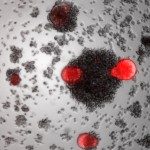Lien vers Pubmed [PMID] – 25339774
J. Virol. 2015 Jan;89(1):615-25
UNLABELLED: Autophagy is a ubiquitous mechanism involved in the lysosomal-mediated degradation of cellular components when they are engulfed in vacuoles called autophagosomes. Autophagy is also recognized as an important regulator of the innate and adaptive immune responses against numerous pathogens, which have, therefore, developed strategies to block or use the autophagy machinery to their own benefit. Upon human immunodeficiency virus type 1 (HIV-1) infection, viral envelope (Env) glycoproteins induce autophagy-dependent apoptosis of uninfected bystander CD4(+) T lymphocytes, a mechanism likely contributing to the loss of CD4(+) T cells. In contrast, in productively infected CD4(+) T cells, HIV-1 is able to block Env-induced autophagy in order to avoid its antiviral effect. To date, nothing is known about how autophagy restricts HIV-1 infection in CD4(+) T lymphocytes. Here, we report that autophagy selectively degrades the HIV-1 transactivator Tat, a protein essential for viral transcription and virion production. We demonstrated that this selective autophagy-mediated degradation of Tat relies on its ubiquitin-independent interaction with the p62/SQSTM1 adaptor. Taken together, our results provide evidence that the anti-HIV effect of autophagy is specifically due to the degradation of the viral transactivator Tat but that this process is rapidly counteracted by the virus to favor its replication and spread.
IMPORTANCE: Autophagy is recognized as one of the most ancient and conserved mechanisms of cellular defense against invading pathogens. Cross talk between HIV-1 and autophagy has been demonstrated depending on the virally challenged cell type, and HIV-1 has evolved strategies to block this process to replicate efficiently. However, the mechanisms by which autophagy restricts HIV-1 infection remain to be elucidated. Here, we report that the HIV-1 transactivator Tat, a protein essential for viral replication, is specifically degraded by autophagy in CD4(+) T lymphocytes. Both Tat present in infected cells and incoming Tat secreted from infected cells are targeted for autophagy degradation through a ubiquitin-independent interaction with the autophagy receptor p62/SQSTM1. This study is the first to demonstrate that selective autophagy can be an antiviral process by degrading a viral transactivator. In addition, the results could help in the design of new therapies against HIV-1 by specifically targeting this mechanism.

